第二节 常见翻译错误举例
E-C
1.I found that he was a confidence man.
误译:我发现他是个有信心的人。
正译:我发现他是个骗子。
分析:a confidence man意思是“骗子”、“欺诈者”,而a confident man则是“有信心的人”。
2.The boy is a love child.
误译:这个男孩是个可爱的孩子。
正译:这个男孩是个私生子。
分析:a love child意思是“私生子”,而a lovely child则是“可爱的孩子”。
3.He ate his words before the teacher.
误译:他在老师面前食言了。
正译:他在老师面前承认了错误。
分析:eat one’s words(=swallow one’s words)意思是“收回前言”、“承认错误”,而“食言”的英语是go back on one’s word或break one’s promise或break one’s word。
4.He has athlete’s foot.
误译:他的脚长得像运动员一样。
正译:他患有脚癣。
分析:athlete’s foot意思是“脚癣”、“香港脚”。
5.He is a green hand.
误译:他的手是绿色的。
正译:他是个新手。
分析:a green hand是“新手”,而不能理解成“绿色的手”。be green in experience是“缺乏经验”。
6.Edward was taken up above the salt.
误译:爱德华坐在食盐的上面。
正译:爱德华被请坐上席。
分析:above the salt是习语,意思是“在上席(源于旧时宴礼,上席是离席上盐瓶最近的席位)”,其反义词则为below the salt,意为“在下席”。
7.I wish peace could be saved at the eleventh hour.
误译:我希望在11点钟能够挽回和平。
正译:我希望在最后关头能够挽回和平。
分析:at the eleventh hour(=the very last moment)意思是“最后时刻”,而汉语的“在11点钟”,英语则是at eleven o’clock。
8.I can do anything but tell lies.
误译:我能做任何事情但总撒谎。
正译:我决不会撒谎。
分析:anything but意思是“决不”,nothing but意为“只有”、“只不过”。
试比较:His English is anything but correct.他的英语错误百出。
His English is nothing but correct.他的英语很不错。
9.He is a busboy.
误译:他是在公交车上工作的男孩。
正译:他是个在餐馆勤杂工。
分析:busboy是餐厅侍者(waiter and waitress)的助手,负责清理餐桌上的脏盘子,可以称作“勤杂工”、“打杂的”。英语中有些单词、词组从字面就可以获得准确的、恰如其分的理解。但有些单词和词组,他们的真正意思和字面不一样,乃至大相径庭,下面列举一些英汉互译时常被误译的单词、词组:
at sea不知所措(不是“在海里”)
bad sailor晕船的人(不是“坏水手”)
bookkeeper簿记员(不是“书籍保管员”)
bull’s eye靶心(不是“牛眼睛”)
capital idea好主意(不是“资本主义思想”)
cooker炊事用具(不是“厨师”)
criminal lawyer刑事律师(不是“犯罪的律师”)
crow’s feet鱼尾纹(不是“乌鸦脚”)
dog days三伏天(不是“狗天”)
dog ear书的折角(不是“狗耳朵”)
drawing room客厅(不是“画室”)
familiar talk庸俗的交谈(不是“熟悉的谈话”)
go moonlighting赚外快(不是“月下漫步”)
goose flesh起鸡皮疙瘩(不是“鹅肉”)
horse sense常识(不是“马的感觉”)
milky way银河(不是“牛奶路”)
on the air在广播中(不是“在空中”)
Peking Men北京猿人(不是“北京人”)
personal remark人身攻击(不是“个人评论”)
rest room洗手间(不是“休息室”)
sleeping policeman减速杠(不是“在睡眠中的警察”)
Sunday drive不常开车的新手(不是“星期天开车者”)
whistle blower敢于揭露上司谎言或丑闻者(不是“吹哨子的人”)
10.He was in his birthday suit.
误译:他穿着他的生日服装。
正译:他一丝不挂。
分析:birthday suit是英美特别是美国惯用的一个非常幽默的俚语,常用作“complete nakedness(赤身裸体)”的一种委婉说法,它本身隐喻的是一个人刚出生时一丝不挂的情景。
11.He is behind time.
误译:他已落伍。
正译:他迟到了。
分析:behind time(=late)意思是“迟到”,而behind the times则是“落伍”、“落后于时代”。
12.He lost a cool thousand dollars.
误译:他损失了一千美元,还很冷静。
正译:他整整损失了一千美元。
分析:cool用于数额前意思为“整整的”、“不折不扣的”。
13.He is Chinese Ambassador.
误译:他是(其他国家)派驻中国的大使。
正译:他是中国(派驻其他国家的)大使。
分析:其他国家派驻中国的大使应译为:the Ambassador to China。
14.Last night I heard him driving his pigs to market.
误译:他昨天晚上把猪赶到市场上。
正译:昨天夜里我听到他鼾声如雷。
分析:driving one’s pigs to market是习语,意思是“打鼾”。
15.For some,hope dies slowly.
误译:对某些人来说,希望就这样慢慢消失了。
正译:对某些人来说,过了很长时间,仍抱有希望。
分析:die有“变弱”、“消失”的意思,“die slowly”means“die hard”,所以此句译成“始终抱有希望”。
16.Family planning is conducted in our country.
误译:我国实行家庭计划。
正译:我国实行计划生育。
分析:family planning(=controlling the number of children one has)意思是“计划生育”。
17.All my advice falls flat on him.
误译:我的忠言使他平地跌倒。
正译:他把我的忠告当作耳旁风。
分析:fall flat在此句意为fail to win applause or appreciation(未受到喝彩或欣赏)。
18.He is good and rich.
误译:他是个好人,而且富有。
正译:他非常富有。
分析:在英语中,good/nice/fine/rare and+形容词或副词用在口语中,相当于副词very,quite,意思是“很”、“非常”、“彻底”,用来加强词义。它构成的短语还有:good and bad(很坏),good and sure(确实地),nice and hard(非常刻苦),nice and warm(很暖和),rare and bright(非常聪明)等。
19.Her younger brother is intellectually challenged.
误译:她的弟弟面对知识挑战。
正译:她的弟弟智商低下。
分析:句中的intellectually challenged是委婉语,英语中表示委婉的说法层出不穷,其他类似的委婉语还有:
bus boy(餐厅打杂工)———sanitarian(卫生员)
butcher(屠夫)———meat technologist(肉类技术专家)
cook(厨子)———chef(烹饪大师)
dishwasher(洗盘子的人)———utensil maintenance man(餐具保洁员)
ditcher(挖沟工人)———excavation technician(挖掘技术员)
dog catcher(捕野狗者)———animal control warden(动物管理人员)
garbage man(垃圾工人)———sanitation engineer(清洁工程师)
hairdresser(理发师)———cosmetologist(美容师)
housewife(家庭主妇)———domestic engineer(内务工程师)
landscape worker(园林工人)———landscape architect(园林建筑师)
maid(女佣人)———domestic help(家政助理)
old people(老人)———senior citizens(年长者)
operator(接线员)———communication monitor(通讯监察人员)
poor people(穷人)———low-income group(低收入的人)
prostitute(妓女)———street girl(街边女子)
salesman(销售员)———manufacturer’s representative(厂商代表)
secretary(秘书)———administrative assistant(行政助理)
shoe maker(鞋匠)———shoe rebuilder(重整鞋者)
slums(贫民窟)———old,more crowded areas(老的、较拥挤的地方)
undertaker(殡仪员)———funeral service practitioner(殡葬服务承办人)
waiter/waitress(服务员)———dining-room attendants(餐厅管理员)
washwoman(洗衣女工)———clothing refresher(衣服清理员)
20.She pulled up her car in the drive.
误译:她把行驶中的车子停下。
正译:她把车子停在私家车道上。
分析:导致误译的关键在于错把drive(私家车道,尤指私宅内的汽车道),理解成“驾驶”,从而将介词短语in the drive错译成“行驶之中的”。例如:Look at the car in the drive.(看那部正停在私家道上的车子。)
21.The lady is in the pink.
误译:那位女士穿着粉红色的衣服。
正译:那位女士身体非常健康。
分析:名词前有无冠词a/an/the往往导致意思发生重大变化。be in the pink(=be in good health)意思是“身体健康”,而be in pink则是“身穿粉红色衣服”。
22.Peter wrote to his brother in care of Mr.Li.
误译:彼得写信给他兄弟,对李先生表示关心。
正译:彼得写信给他兄弟,由李先生转交。
分析:in care of sb.意思是“由某人转交”,常用于信封上,多缩写成c/o。
23.Susan is at home in cooking.
误译:苏姗在家烧饭。
正译:苏姗擅长烹饪。
分析:be at home in意思是“擅长”。
24.Your loss is nothing to mine.
误译:你的损失与我无关。
正译:你的损失和我的比较起来算不了什么。
分析:本句中的mine表示“my loss”,be nothing to意思是“不能与……相比”、“对……无足轻重”。如果要表达“你的损失与我无关”,英语为Your loss has nothing to do with me.
25.He kicked the bucket at last.
误译:他最后把桶踢翻了。
正译:他最后死了。
分析:kick the bucket是俚语,相当于一个不及物动词“die”,意思是“死掉”、“翘辫子”、“蹬腿儿”,而不能直译为:“踢水桶”。英、汉语中有多达一百余种“死”的表达法,其中最常用的如:

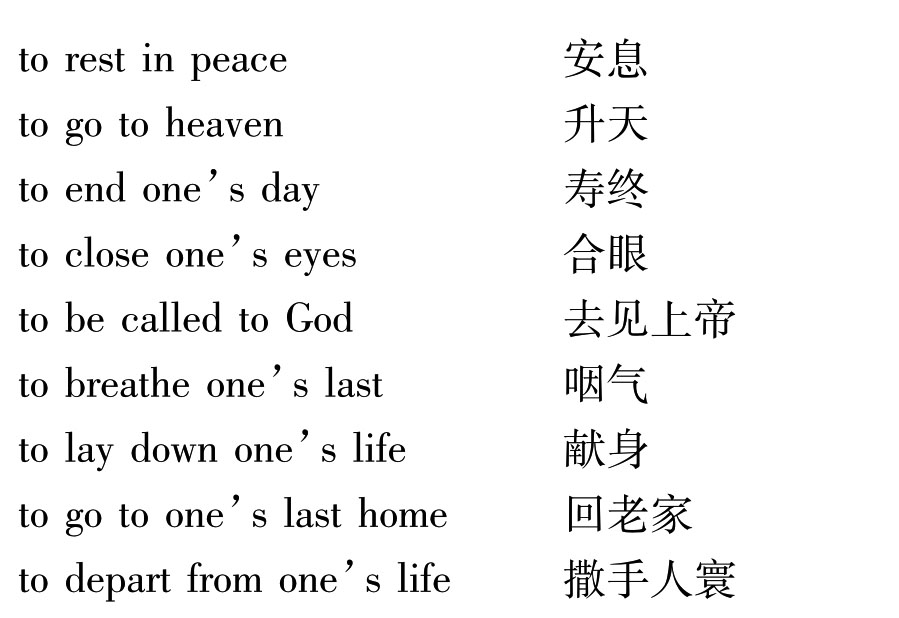
26.To my joy,my son knows a thing or two about Italian.
误译:使我高兴的是,我儿子对意大利语还略知一二。
正译:使我高兴的是,我儿子对意大利语还很精通。
分析:knows a thing or two是个固定习语,意思是“见多识广”、“明白事理”、“很有经验”。
27.Knowing about a language doesn’t mean knowing the language.
误译:了解一种语言并不意味着掌握一种语言。
正译:知晓一种语言并不意味着通晓一种语言。
分析:know a language意思是“通晓一种语言”,即意味着会读、会写、会讲等,而know about a language则是“知晓一种语言”,即意味着具有该种语言的知识,不一定通晓。
28.The young man has lost his heart.
误译:这个青年人失去信心了。
正译:这个青年人爱上了一个人。
分析:在英语中,有时名词前有无物主代词意思相差很大。lose one’s heart(to sb.)(=fall in love with sb.)意思是“爱上了一个人”,而lose heart则是“失去信心”。
29.His English leaves nothing to be desired.
误译:他的英语毫无希望。
正译:他的英语无可挑剔。
分析:nothing to be desired意思是“不能指望更好”。
30.He is a man of family.
误译:他是有家室的人。
正译:他出身豪门。
分析:of family意思是“出身高贵”,如果要表达“他是有家室的人”,英语为He is a family man.
31.This is an open question.
误译:这是个公开的问题。
正译:这是个没有解决的,有争议的问题。
分析:open在此句中意思是“未解决的”、“容许争议的”。
32.He often plays gooseberry.
误译:他经常玩醋栗。
正译:他经常不知趣地夹在一对情侣中间。
分析:play gooseberry是美国口语,意思是“不知趣地夹在一对情侣中间”、“当电灯泡”。
33.Though she is only four,Lucy can put two and two together.
误译:虽然露西只有4岁,她已经能够算出2加2了。
正译:虽然露西只有4岁,她已经能做出判断了。
分析:put two and two together或put this and that together意思是“根据情况做出判断”。
34.The thief was caught red-handed.
误译:小偷被抓时满手是血。
正译:小偷作案时当场被抓。
分析:red-handed是形容词,意思是“当场的”、“正在犯罪的”。
35.I know that fellow.He is a Spanish athlete.
误译:我知道那个家伙,他是个西班牙田径运动员。
正译:我知道那个家伙,他是个胡说八道的家伙。
分析:Spanish athlete是美国俚语,常用来指“吹牛的人”、“胡说八道的家伙”。在英语中常用地名、国名来与其他名词相结合,指代其他的意思,例如:
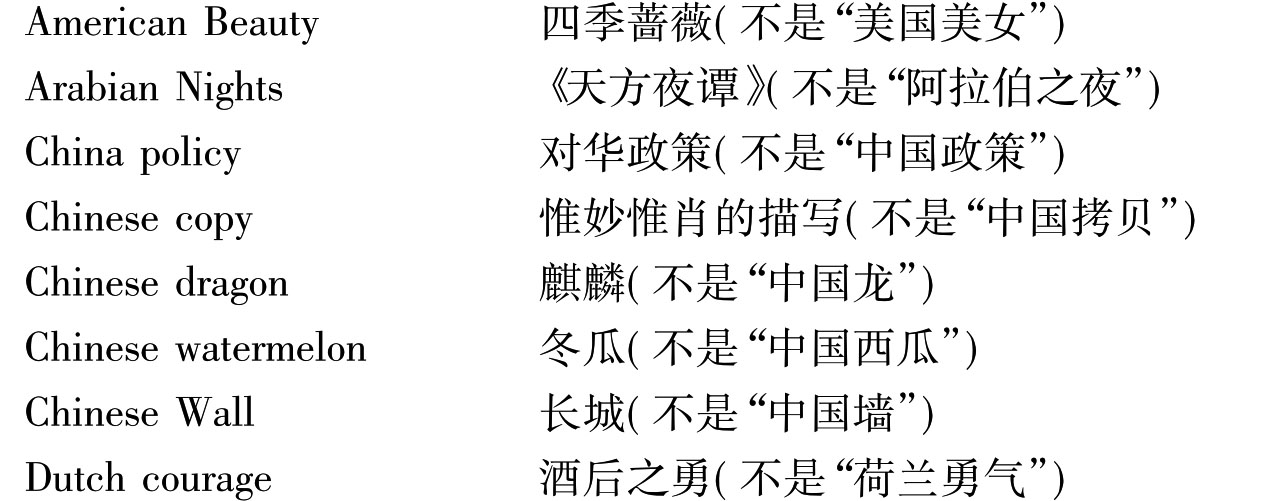
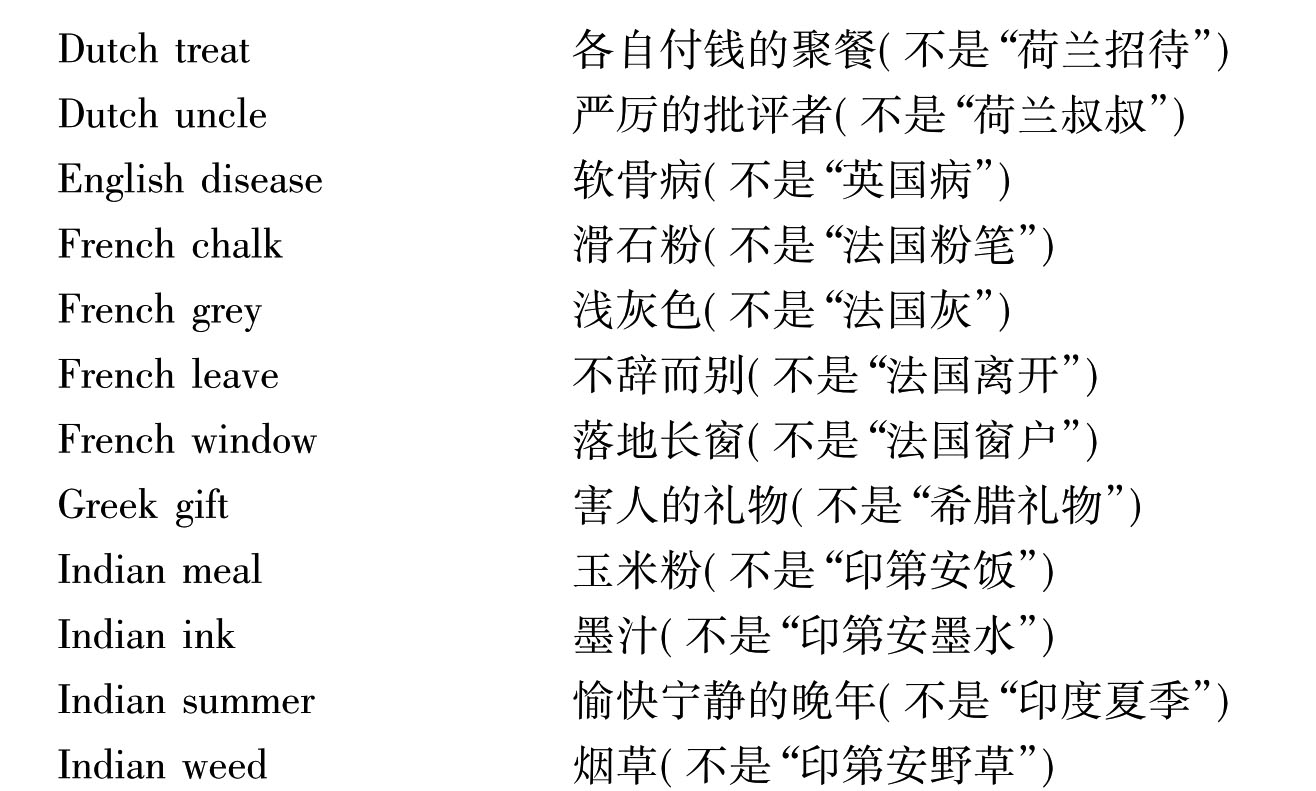
36.Stop selling me to him.
误译:不要出卖我。
正译:别当他的面说我的好话。
分析:sell还有“推销”、“宣传”之意,故亦称“向他宣扬我”,引申为“别当他的面说我的好话”。
37.May I see you home?
误译:我可以到你家参观吗?
正译:我可以送你回家吗?
分析:see somebody home意思是“送某人回家”。
38.I need some sweet water.
误译:我需要些甜水。
正译:我需要些淡水。
分析:sweet water意思是“淡水”、“饮用水”,而sweetened water则是“甜水”。
39.He succeeded to a large property.
误译:他成功获得一笔大的财产。
正译:他继承了一大笔财产。
分析:succeed to意思是“继承”,而succeed in则是“成功”。
40.The old man touches no spirits.
误译:那位老人无精打采。
正译:那位老人不喝烈酒。
分析:spirits(复数)是指烈性酒,如白兰地,威士忌等。
41.He usually sleeps late.
误译:他通常很晚才入睡。
正译:他通常很晚才起床。
分析:sleep late意思是“晚起”、“睡懒觉”,而go to bed late则是“晚睡”。
42.We have seen him through.
误译:我们看透了他。
正译:我们帮他渡过了难关。
分析:see sb.through是个惯用语,意思是“帮助某人渡过难关”、“帮某人帮到底”,而see through sb.才是“看透某人”,see through sth.是“识破某事”。
43.When do you want to start a family?
误译:你希望什么时候开始建立家庭?
正译:你希望什么时候生第一个孩子?
分析:start a family不是“成家”,而是give birth to the first child(生第一个孩子)。
44.You can always tell the somebodies from the nobodies at a cocktail party.The somebodies come late.
误译:在鸡尾酒会上,你可以知道有无人到或有人迟到。
正译:你在鸡尾酒会上总是可以分辨出大人物和无名小卒来。大人物总是迟到。
分析:作名词用的somebody是与nobody对称的,前者为“大人物”,后者为“微不足道的人”。
45.He is talking horse.
误译:他在谈论马。
正译:他在吹牛。
分析:talk horse(=talk big)意思是“吹牛”、“说大话”,而talk about(of) the horse则是“谈论马”。
46.Both of them like to talk turkey.
误译:他们俩都喜欢谈论火鸡。
正译:他们俩都喜欢坦率、开诚布公地谈话。
分析:talk turkey(美国俚语)意思是“坦率、开诚布公地谈话”,而talk of(about)the turkey则是“谈论火鸡”。
47.He was the best man at the wedding.
误译:他是婚礼上最好的男人。
正译:他是婚礼上的伴郎。
分析:the best man意思是“伴郎”,maid of honor是“伴娘”。
48.His words are worth taking with a grain of salt.
误译:他的话中带着一粒盐。
正译:他的话不能全信,应该打些折扣。
分析:take(receive)sth.with a grain of salt表示“对……采取保留的态度”、“对……将信将疑”。
49.She was with child.
误译:她带着一个孩子。
正译:她怀孕了。
分析:be with child意思是“怀孕”,而be with a child则是“带着一个孩子”。child前是否有不定冠词a,意义相差很大。
50.I hate those yellow newspapers.
误译:我讨厌那些黄色报纸。
正译:我讨厌那些哗众取宠的报纸。
分析:yellow在这里并不是“淫秽下流”、“色情堕落”的意思。yellow newspaper是指“为吸引读者,扩大影响而夸大其词、哗众取宠的报纸。”而“黄色报纸”的英文是pornographic newspaper。在翻译颜色词的时候不能“望文生义”。下面列出一些不是“颜色”的颜色词:
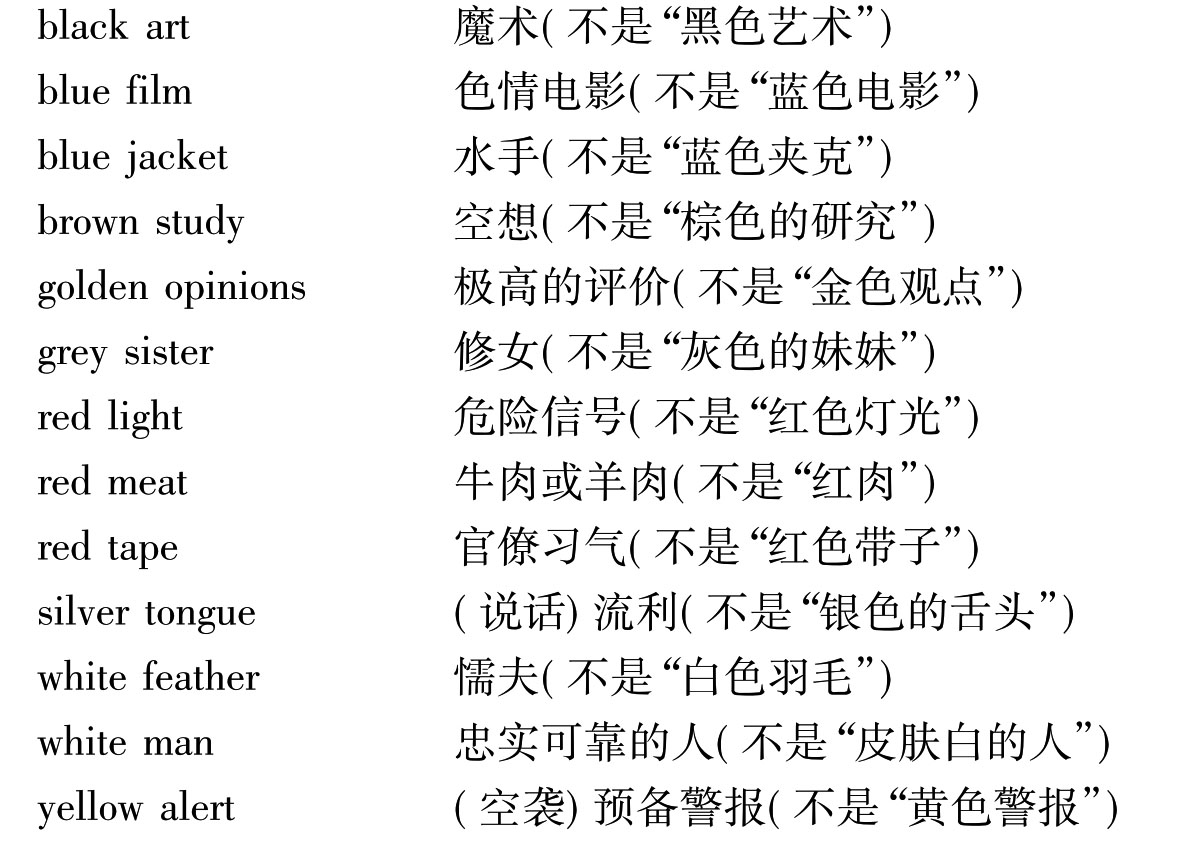
C-E
1.王先生上月生了个男孩。
误译:Mr.Wang bore a son last month.
Mr.Wang gave birth to a son last month.
正译:Mr.Wang begot a boy baby last month.
分析:bear是指女人“生孩子”,而男人“生”孩子则用beget。刚生下的“男孩”一般不叫son,而是boy baby。
2.我请你喝一杯。
误译:I’ll pay you a drink.
正译:I’ll buy you a drink.
Let me get you a drink.
分析:表示请某人“喝一杯”、“吃一顿”时,通常是用动词buy或get。pay a person是表示“付钱给某人”。
3.他累断了腰才把儿子抚养成人。
误译:He broke his waist to bring up his son.
正译:He broke his neck to bring up his son.
分析:break one’s neck是习语,意思是“拼命(做某事)”。
4.宁做鸡头,不做凤尾。
误译:Better be the head of a cock than the tail of a phoenix.
正译:Better be the head of a dog than the tail of a lion.
分析:每种语言中都有许多约定俗成的表达,我们在翻译时则需遵照各自的语言习惯。中文是“鸡头”和“凤尾”对比,而英语中却要用“狗头”和“狮尾”对比。在借喻上是有差别的。
5.每节课老师都会点名。
误译:The teacher will call our names in every period of class.
正译:The teacher will call the roll in every period of class.
分析:汉语中的“点名”在英语中应用call the roll来表示,而call one’s names则是“辱骂某人”。
6.如果我睡过头了,你就叫醒我。
误译:Call me up if I oversleep the usual hour of rising.
正译:Call me if I oversleep.
分析:call sb.up意思是“给某人打电话”。call me本身就已经含有“叫醒某人”的意思,无需再加up。oversleep本身就有“睡过头”之意,是不及物动词,后面不能跟宾语。
7.我很关心你的健康。
误译:I am very concerned about your health.
正译:I care a lot for your health.
分析:be concerned about意思是“担心”、“担忧”,而care for则是“关心”、“关怀”。
8.我不怕冷。
误译:I’m not afraid of coldness.
正译:I don’t mind the cold weather.
分析:汉语说的“不怕冷”指的是“不在乎天气冷,可以承受低温”,而不是对“冷”这种抽象概念的害怕。英语afraid多指“心理”、“感情”。
9.他们在沉思。
误译:They are in deep thought.
正译:They are deep in thought.
分析:deep in...是惯用表达法,意思是“深陷于”、“埋头于”。例如:他债台高筑。He is deep in debt.
10.让我们为大卫的健康干杯。
误译:Let’s drink for David’s health.
正译:Let’s drink to David’s health.
分析:汉语中的“为某人的健康干杯”在英语中应用drink to sb.’s health来表示。
11.盐在热水中很容易溶化。
误译:Salt is easy to melt in hot water.
正译:Salt is easy to dissolve in hot water.
分析:盐在水中的溶化实际上是溶解到水中去,而非自身经过加热由固态熔化成液态,所以应用dissolve(溶解),而不能用melt(溶化)。
12.昨天我们玩得很愉快。
误译:We played very pleasantly yesterday.
正译:We enjoyed ourselves very much yesterday.
We had a good time yesterday.
分析:“玩牌”、“打球”、“演戏”等用play,但汉语这里说的“玩”是指“度过一个愉快的时光”,所以应译为enjoy oneself或have a good time。
13.你去弄些水来。
误译:Go and bring some water.
正译:Go and fetch some water.
分析:bring虽然表示“带来”,但它是让某人在来的时候将某物带来。而fetch则是让身边的某人“去取某物”,它包括往返的两段路程。
14.如果你身体好,想干什么就能干什么。
误译:If you have good body,you can do what you like to do.
正译:If you are in good health,you can do what you like to do.
分析:在英语中有strong body(身体强壮有力)这种说法,而good body是受到汉语影响而生造的,是不符合英语的表达习惯的中式英语。下面列举一些汉英互译时常被误译的词组:
跑车sports car(不是“run car”)
中国专家Chinese expert(不是“China expert”)
拳头商品competitive products(不是“fist products”)
手提电脑portable computer(不是“hand computer”)
街道妇女housewives of the neighborhood(不是“street women”)
15.看见别人先后富起来,他非常眼红。误译:Seeing others become rich one after another,he was absolutely red-eyed.正译:Seeing others become rich one after another,he was green with envy.分析:汉语中“眼红”是“妒忌”的意思,而英语green with envy才是形容人非常羡慕嫉妒别人。
16.你身上带钱了吗?
误译:Do you carry any money with you?
正译:Do you have any money on you?
Do you take any money with you?
分析:平时身上带钱,用have或take,一般不用carry。
17.你该吃晚饭了。
误译:It is time to eat your dinner.
正译:It is time to have your dinner.
分析:不是所有汉语中的“吃”字都能翻译为英语“eat”的,英语中有许多固定搭配,如:be jealous(吃醋);take medicine(吃药);be very popular(吃香);bear hardships(吃苦);have a thorough grasp(吃透);get dividends(吃红利);get commission(吃回扣);attend the wedding banquet(吃喜酒)等。
18.我希望你不要拖我的后腿。
误译:I hope that you won’t pull my leg.
正译:I hope that you won’t hold me back.
分析:pull one’s leg(=make fun of sb.)意思是“戏弄某人”,“开某人的玩笑”,而英语中表达“拖某人的后腿”则是hold sb.back或be a drag on sb.等。
19.他以租船给观光客维持生活。
误译:He makes his living renting boats to tourists.
正译:He makes his living hiring(out)boats to tourists.
分析:英语的rent有“向别人租用”及“出租”两种含义。但是rent一般用于长时间的租赁,如出租房子、公寓等。而hire则指较短期的租赁,如租船、礼服、汽车等。
20.你认为这部电影怎么样?
误译:How do you think of the movie?
正译:How do you like the movie?
What do you think of the movie?
分析:该句的“怎么样”其实际意义是“对……有某种看法”。英语要用句型:What do you think of...?或How do you like...?来表达。
21.我是一个中国人。
误译:I am a Chinese.
正译:I am Chinese.
分析:第一句译文是不地道的,正确的说法应该去掉不定冠词,或者说I am a Chinese man。同样,“他是一个英国人。”应译为:He is English.或He is an Englishman.而不说:He is an English.
22.你的英语水平比我高。
误译:Your English level is higher than mine.
正译:You know more English than I.
分析:“英语水平”一般不说English level。所谓“你的英语水平高”,其实就是your English is very good。level一词纯属多余。
23.他酣睡如猪。
误译:He is sleeping like a pig.
正译:He is sleeping like a log.
分析:pig在中西方文化中的内涵不同。pig在英语中可以指“肮脏的人”、“贪吃的人”、“肥胖的人”,而没有汉语文化中的“贪睡的”意思。
24.中国的人口比日本多。
误译:The population of China is more than that of Japan.
正译:The population of China is larger/bigger than that of Japan.
分析:在英语中指population(人口)“多少”一般用big/large或small,而指people(人)“多少”应用many或few。
25.真抱歉,我把书包忘在教室里了。
误译:I’m terribly sorry.I forgot my schoolbag in the classroom.
正译:I’m terribly sorry.I left my schoolbag in the classroom.
分析:汉语中的“忘记带来”在英语中应用动词leave来表示。
26.我们需要水且离不开水。
误译:Water is necessary to us,and we can’t leave water.
正译:Water is necessary to us,and we can’t live without water.
分析:英语单词leave与汉语“离开”都有go away的意思。但汉语“离不开水”的内涵是“不能没有水”,而不是在距离上远离水。
27.我想要一点白酒。
误译:I’d like a little bit of white wine.
正译:I’d like a little bit of liquor.
分析:汉语中的“酒”可指任何酒,包括白酒、葡萄酒、啤酒,甚至米酒;但英语中则要分别用liquor,wine,beer及rice wine来表示。英语的wine是指由果汁经发酵而制成的酒,但多指葡萄酒。如white wine不是“白酒”,而是“白葡萄酒”,red wine(红葡萄酒),dry white wine(干白)等。
28.汉语是我们的母语。
误译:Chinese is our mother language.
正译:Chinese is our mother tongue.
分析:tongue除了指“舌头”,还可以用来指“语言”、“方言”,“母语”在英语中用mother tongue表达,还可以说parent language或linguistic parent,但mother language的说法却是不地道的。
29.他第一次遇到了挫折。
误译:He first met with failure.
正译:He met with failure for the first time.
分析:first met with failure意思是“首先遇到了挫折”,这句话似乎没有说完,后面似乎应该接着“后来又遇到了……”,从而无法明确表达“第一次”。
30.你喜欢喝茶还是咖啡?
误译:Which do you prefer more,tea or coffee?
正译:Which do you prefer,tea or coffee?
Which do you like better,tea or coffee?
分析:prefer本身有“较喜欢(like better)”的意思,若句中用了prefer,就不需再用more了。
31.明天我要到爷爷家拜年。
误译:I’ll go to visit my grandfather and say“Happy New Year”to him tomorrow.
正译:I’ll pay a New Year call to my grandfather tomorrow.
分析:汉语中的“拜年”在英语中应用pay a New Year call to sb.或wish sb.a Happy New Year来表示。
32.玛丽就像一只骄傲的公鸡,从来不爱搭理别人。
误译:Mary is proud as a cock,and she never talks to others.
正译:Mary is proud as a peacock,and she never talks to others.
分析:中国文化里,孔雀是美丽的体现、吉祥的象征。而在英语中peacock的象征意义基本上是否定的,他不强调孔雀美丽的一面,而更注重它骄傲的一面,所以英美人在形容一个人骄傲、狂妄和爱慕虚荣时,就把他(她)比作peacock。下面列举一些常见的这种“指鹿为马”的表达法:
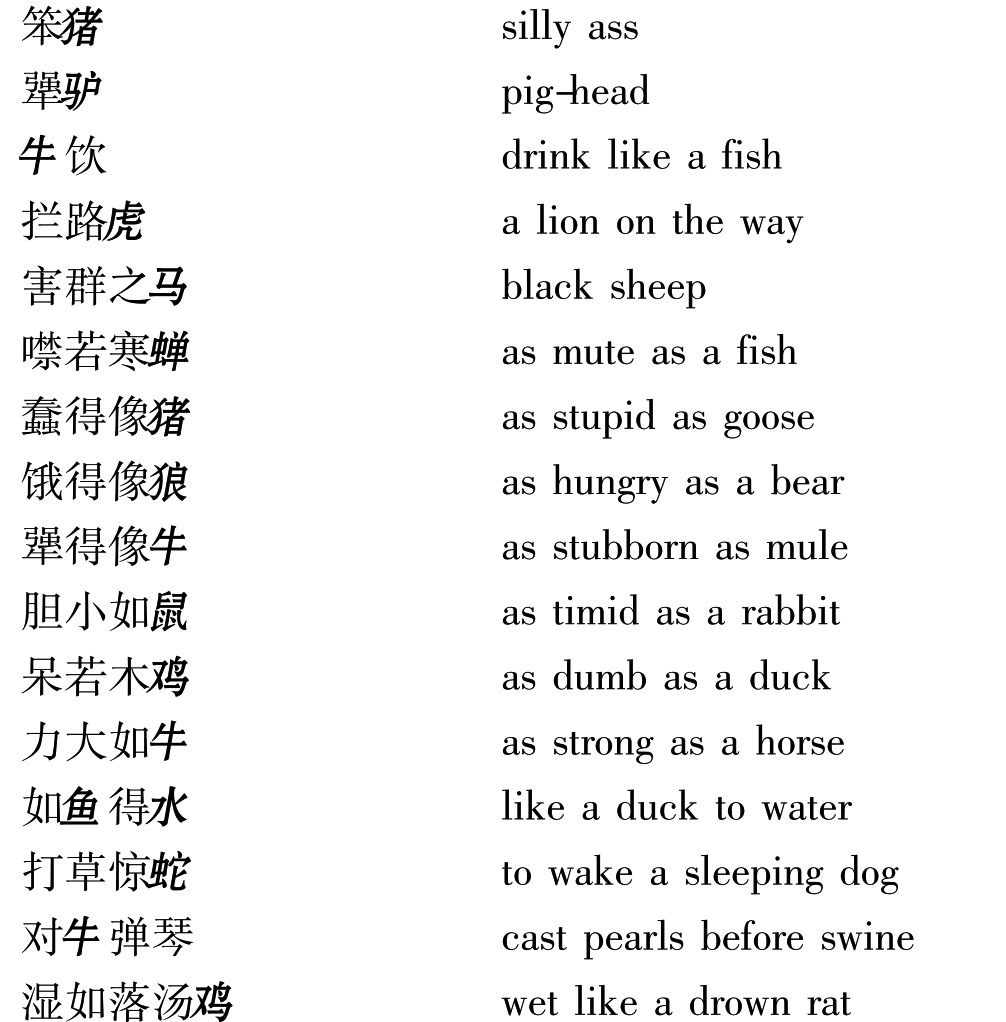

33.太阳从东方升起。
误译:The sun rises from the east.
正译:The sun rises in the east.
分析:该句中的from改为in,这是惯用法。英语中很多表达法是约定俗成的,与汉语差别较大。例如:汉语说“肤浅”,英语却说skin-deep(肤深);汉语说“海豹”,英语却说sea dog(海狗);汉语说“红茶”,英语却说black tea(黑茶)。
34.你能给我介绍一本好书吗?
误译:Could you introduce me a good book?
正译:Could you recommend me a good book?
分析:把某甲介绍给某乙,使他们认识,或把某物、某种风俗习惯传到另一地方,用introduce。
把某物介绍、推荐给某人或把某人推荐给某人,应用recommend。这句话中“介绍”的实际汉语意思是“推荐”。
35.在晚会上,邀请一位老师为我们唱几首歌曲。
误译:At the party a teacher was required to sing some songs for us.
正译:At the party a teacher was requested to sing some songs for us.
分析:require意思是“要求”、“命令”,是指提出要求的人有权利要对方做某事。而request是“请求”的意思,比ask稍正式一些。
36.学习英语应当循序渐进。
误译:To learn English is step by step.
正译:To learn English,one must go step by step.
分析:“循序渐进”是指学习英语的方式,将step by step等于to learn English,显然是不合逻辑的。step by step是惯用语,只能作副词用。
37.他的工作就是收发信件。
误译:His job is to receive and send letters.
正译:His job is to send and receive letters.
分析:英汉两种语言的表达顺序往往存在差异,有时需要调整语序来符合译文的表达习惯。汉语说“收发”,而英文的语序却恰恰相反,是先“发”再“收”。又如:不论晴雨(rain or shine),迟早(sooner or later),前后(back and forth),钢铁(iron and steel),血肉(flesh and blood),左右(right and left)等。
38.他重男轻女。
误译:He regards men are heavy,while women are light.
正译:He regards men as superior to women.
分析:直接根据汉语的“重”和“轻”来找英语中相应的单词heavy和light来表达,字面意思正确,但显然无法表达“男人的地位高于女人”的内涵。
39.这辆车的后窗玻璃上写着“教练车”。
误译:There is a sign on the rear window of the car,saying“coach car”.
正译:There is a sign on the rear window of the car,saying“student car”.
分析:student用作定语时可以表示“实习的”,所以“教练车”应用“student car”来表示。
40.我将告诉你一个最新消息。
误译:I’m going to tell you the newest news.
正译:I’m going to tell you the latest news.
分析:汉语中的“最新消息”在英语中应用the latest news来表示。消息的“新旧”实际上是指“获悉消息的早晚”。
41.他喜欢说笑话。
误译:He likes saying jokes.
正译:He likes telling jokes.
分析:汉语中的“说笑话”在英语中应用tell jokes来表示。
42.随便叫个人来帮忙,张三李四都行。
误译:Get someone to help,Zhang San,Li Si or anyone else.
正译:Get any Tom,Dick or Henry to help.
分析:汉语中用“张三李四”泛指任何人。在英语中Tom,Dick or Henry是个习惯用法,在口语中经常不表示人名,而是指“普普通通的人”、“一般人”。
43.茶树在这片山地上长得很好。
误译:Tea trees grow well in these mountain fields.
正译:Tea grows well in these mountain fields.
分析:“茶树”、“果树”等在翻译成英语时常常省略tree,因为这些词本身就包含“树”的意思。如orange(橘子树),banana(香蕉树)等。
44.尽管是一个大学生,他连一封英文信都写不好。
误译:In spite of a college student,he cannot write an English letter properly.
正译:Though(he is)a college student,he cannot write an English letter properly.
分析:in spite of有时译为“尽管”,但其深层含义是“不为困难或阻碍所阻”、“全然不顾”。所以,用在此句中是不合适的。应改用though。
45.我以最便宜的价格买下这座房子。
误译:I bought the house at the cheapest price.
正译:I bought the house at the lowest price.
分析:汉语说“便宜的价格”,英语要说“low price”,不能说“cheap price”。另外,汉语有“最高速度”的说法,英语却没有“the highest speed”的说法。而要说“at full speed”。
46.这座桥的质量不好。
误译:The quality of this bridge is poor.
正译:This bridge was not well built.
分析:英美人对大桥,楼房等的建筑工程质量一般不用quality一词。例如:该大楼的工程质量很好。The building has been well built.
47.旅行打开了我们的视野。
误译:Travel opens our horizons.
正译:Travel widens our horizons.
分析:汉语中的“打开眼界”在英语中应用widen/broaden one’s horizons来表示。
48.我不知道下一步该怎么办。
误译:I don’t know how to do next.
正译:I don’t know what to do next.
I don’t know how to do it next.
分析:汉语中的“怎么办”,在英语中应用疑问代词what作动词do的宾语。如果用how,则动词do后必须带宾语。
49.你、我、他已经被选上了。
误译:You,I and he have been chosen.
正译:You,he and I have been chosen.
分析:几个人称代词并列时,英语习惯把第一人称放在最后,第二人称放在第三人称和第一人称之前。但在承认错误或自我批评时例外,例如:我们俩得为这个错误负责。I and you are responsible for this mistake.
50.我18岁高中毕业。
误译:I graduated from high school at 18 years old.
正译:I graduated from high school at 18.
分析:英语中表示某人“在几岁时”的说法有很多种表达,例如:“他20岁”可表示为:
He is twenty.
或He is a twenty-year-old man.
或He is aged twenty.
或He is at age twenty.
或He is at the age of twenty.
或He is twenty years of age.
Exercises
一、将下列英文对号入座
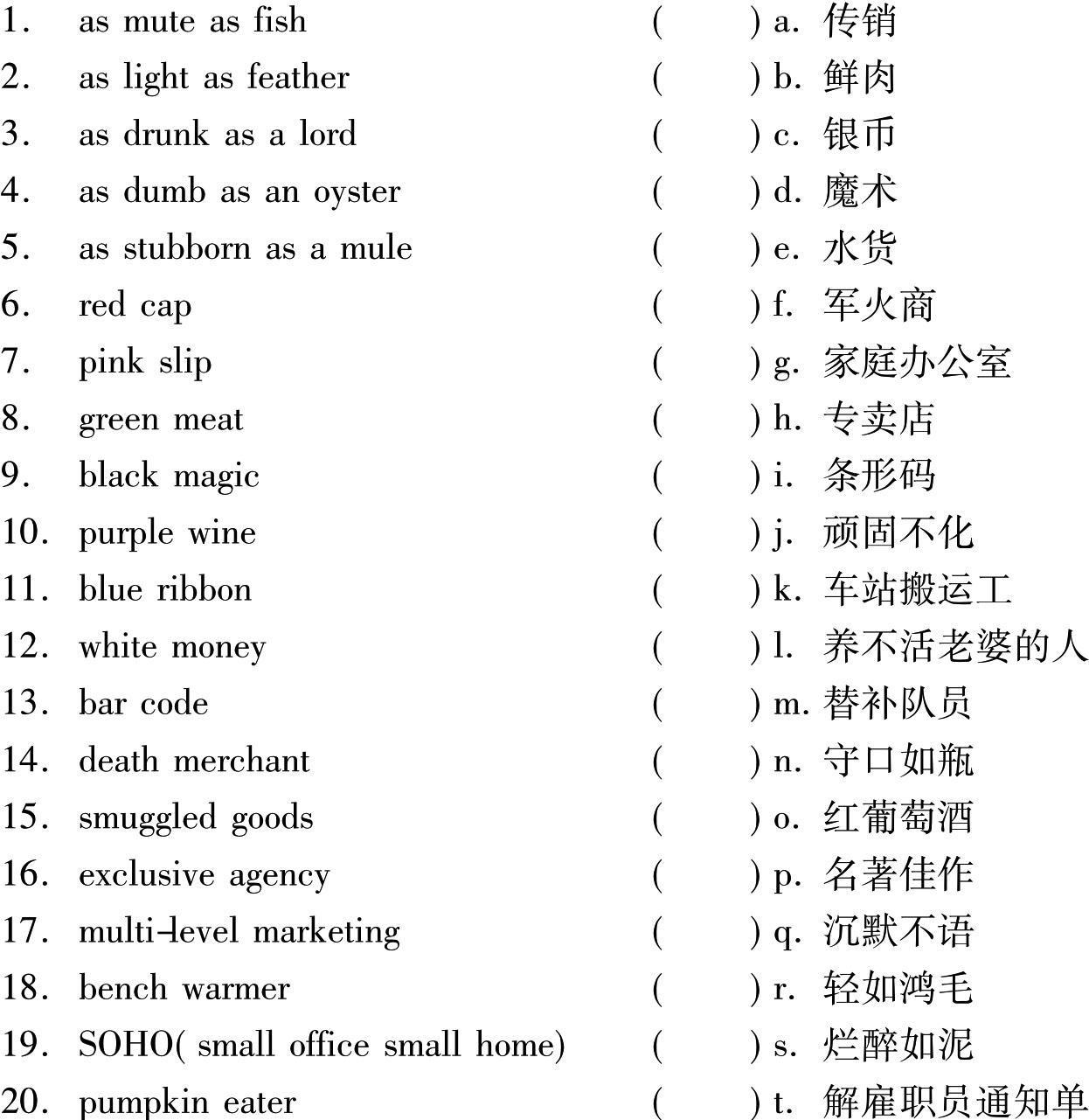
二、将下列中文对号入座
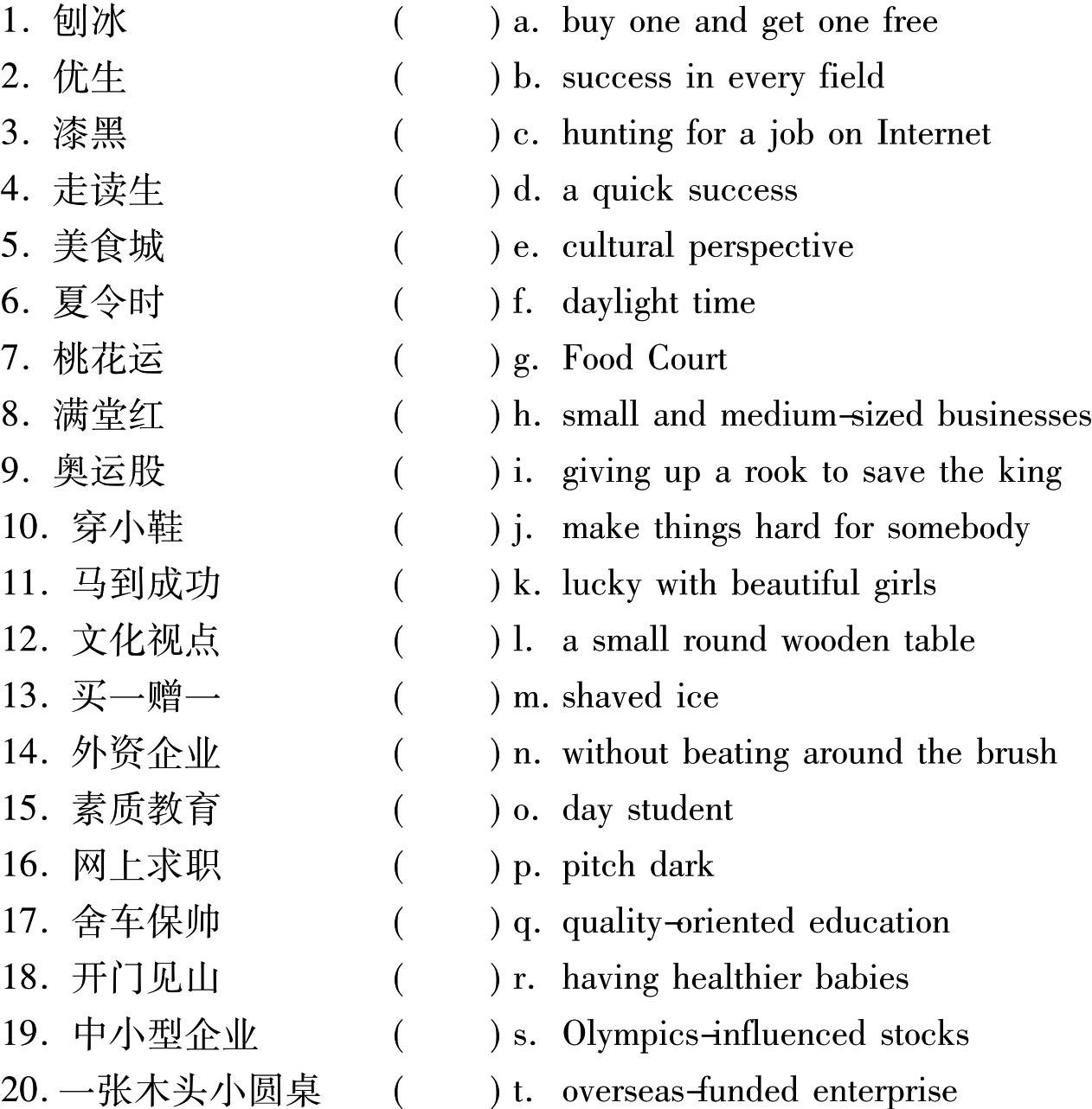
三、下列各句英译汉都给出了两种译文,请选择正确的译文。
1.There are experts and experts.
A.这儿有很多专家。
B.专家和专家大不一样。
2.I want to answer the call of nature.
A.我想解小便。
B.我想回应大自然的呼唤。
3.He bought some salts.
A.他买了些食盐。
B.他买了些泻药。
4.I am getting ahead of the story.
A.我讲到故事前边去了。
B.我讲到故事后边去了。
5.A proud man will hold his nose in the air.
A.傲慢之人总爱翘尾巴。
B.傲慢之人总爱翘鼻子。
6.Chemistry is good book to me.
A.我对化学一窍不通。
B.化学对我是一本好书。
7.The country has gone dry.
A.这个国家已经干旱。
B.这个国家已经禁酒了。
8.He founded a new school of his own.
A.他创立了自己的学派。
B.他创立了一所自己的学校。
9.He likes his coffee nice and hot.
A.他喜欢滚烫的咖啡。
B.他喜欢又好又热的咖啡。
10.The old lady has gone to her long rest.
A.那个老太太去世了。
B.那个老太太睡大觉去了。
11.He is a man of many trades.
A.他是个做很多生意的人。
B.他是个从事过很多行业的人。
12.He has seen little of life.
A.他只懂很少的生活。
B.他没有见过什么世面。
13.He is not a well man.
A.他不是个好人。
B.他这人身体不好。
14.She is a man.
A.她是个男人。
B.她不像个女人。
15.He is an old woman.
A.他是老妇女。
B.他是个婆婆妈妈的男人。
16.It pays to get an education.
A.受教育需要付费。
B.受教育是划算的。
17.He’s leading a dog’s life.
A.他过着非人的生活。
B.他过着狗一样的生活。
18.She has no family of her own.
A.她没有自己的家庭。
B.她没有亲生的子女。
19.I’d like to see the back of him.
A.我巴不得他滚蛋。
B.我想见到他的后背。
20.This is a very good price.
A.这真是太便宜了。
B.这是个很好的价钱。
21.She is a back-seat driver.
A.她坐在司机后面。
B.她是个多管闲事的人。
22.You are all thumbs!
A.你的手指都是拇指。
B.你这个人笨手笨脚。
23.Mike is a promising young man.
A.迈克是个有前途的年轻人。
B.迈克是个信守诺言的年轻人。
24.There was plenty of pepper left in the old man.
A.那位老人脾气依然火爆。
B.那位老人依旧精力充沛。
25.The litter girl has a sweet tooth.
A.这个小姑娘嘴巴很甜。
B.这个小姑娘喜欢吃甜食。
26.All the answers are not right.
A.所有的回答都不对。
B.并非所有的回答都对。
27.He is a straight thinker.
A.他是个思考直率的人。
B.他是个思维有条理的人。
28.She is a homely woman.
A.她是一个家庭妇女。
B.她是一个朴素的女人。
29.He is tired from the work.
A.他厌倦干这项工作。
B.他干这项工作干累了。
30.It was an uphill work.
A.这是一件上山的工作。
B.这件事办起来如同爬山,吃力得很。
31.The business woman is in the green.
A.那女企业家正当年富力强。
B.那女企业家身着绿色服装。
32.He was between the sheets by eleven.
A.11点时,他已睡在被窝里了。
B.11点时,他已在床单之间了。
33.This is an“egg-and-hen”question.
A.这是一个“鸡蛋和鸡”的问题。
B.这是一个长期争论不休的问题。
34.The teacher is not necessarily a scholar.
A.老师不需要是学者。
B.未必学者才能当老师。
35.You cannot praise him too highly.
A.你不能过分表扬他。
B.无论你怎样表扬他都不过分。
36.I got a job as the automotive internist.
A.我得到了一份汽车修理工的工作。
B.我得到了一份汽车内科医生的工作。
37.You have taken the words out of my mouth.
A.这话是你逼我说的。
B.你说出了我的心里话。
38.He was really a dog in the manger.
A.他真是个马厩里的狗。
B.他真是个占着茅厕不拉屎的人。
39.It would be one setback too many for him.
A.他可再也经不住什么挫折了。
B.这是一个对他来说太多的挫折。
40.He can speak wonderful Queen’s English.
A.他能说一口流利的标准英语。
B.他能说一口流利的女王的英语。
41.We eat what we can and what we can’t we can.
A.我们能吃的就吃,吃不下的也勉强吃。
B.我们能吃的就吃,吃不完的就制成罐头。
42.It is a wise that never makes mistakes.
A.聪明的人从不犯错误。
B.无论怎样聪明的人也难免犯错误。
43.He was so infuriated that he showed the man the door.
A.他大发脾气,把门指给那人看。
B.他大发脾气,把那个人赶走了。
44.Don’t show the white feather to the enemy.
A.不要向敌人示弱。
B.别向敌人展示白羽毛。
45.There is a mixture of the tiger and the ape in his character.
A.他的性格既残暴又狡猾。
B.他既有老虎的性格又有猿猴的性格。
46.Shoppers would never be more than a mouse-click from the best deals.
A.购物者只需点击一下鼠标即可做成一笔最好的交易。
B.购物者离最好的交易再也不会超过点击一下鼠标的距离。
47.George can be relied on.He eats no fish and plays the game.
A.乔治为人可靠。他既忠诚又正直。
B.乔治为人可靠。他不吃鱼,还玩游戏。
48.True friendship is like health,the value of which is seldom known until it is lost.
A.真正的友谊就像健康一样,失掉了才觉得宝贵。
B.真正的友谊就像健康一样,它的价值直到失掉还很少被知道。
49.When Jean graduated from high school,she looked at the world through
rose-colored glasses.
A.琼高中毕业的时候,她把一切事情看得太容易了。
B.琼高中毕业的时候,是戴着玫瑰色的眼镜看周围的一切。
50.In the evening,after the banquets,the concerts and the table tennis exhi
bitions,he would work on the drafting of the final communiqué.
A.晚上在宴会、音乐会、乒乓球表演以后,他还得起草最后公报。
B.晚上在参加宴会、出席音乐会、观看乒乓球表演以后,他还得起草最后公报。
51.You flatter me.
A.你过奖了。
B.你拍我马屁。
52.May I be excused?
A.我可以被原谅吗?
B.我去方便一下好吗?
53.He is dead,as I live.
A.他的确是死了。
B.他死了,我还活着。
54.This problem is above me.
A.这个问题我不懂。
B.这个问题在我头上。
55.I’m a small potato.
A.我是一个小人物。
B.我是一个小土豆。
56.She is a busybody.
A.她是个大忙人。
B.她是个爱管闲事的人。
57.I think you’re pulling my leg.
A.我想你在拖我的后腿。
B.我想你在跟我开玩笑。
58.I’m afraid that’s not my cup of tea.
A.这恐怕不是我的茶。
B.恐怕那不合我的胃口。
59.Do you see any green in my eye?
A.你以为我是好欺负的吗?
B.你从我的眼睛里看到绿颜色吗?
60.A little bird told me the news.
A.一只小鸟将此消息告诉我。
B.消息灵通人士将此消息告诉我。
四、下列各句汉译英都给出了两种译文,请选择正确的译文
1.请把窗帘打开。
A.Please open the curtains.
B.Please draw back the curtains.
2.这是个口误。
A.It is an oral mistake!
B.It is a slip of the tongue!
3.我买不起汽车。
A.I cannot buy a car.
B.I cannot afford a car.
4.该起床了,懒虫!
A.It’s time to get up,lazy worm!
B.It’s time to get up,lazy bones!
5.昨天晚上我睡得很晚。
A.I slept very late last night.
B.I stayed up very late last night.
6.她是个独生子女。
A.she is an only child.
B.she is a single child.
7.他不怕吃苦。
A.He can bear hardships.
B.He doesn’t fear hardships.
8.你的手表不对。
A.Your watch is not correct.
B.Your watch doesn’t keep time.
9.未经允许,任何人不得入内。
A.Nobody can come in without permission.
B.Anybody can not come in without permission.
10.这是外国的先进经验。
A.This is foreign advanced experience.
B.This is the advanced foreign experience.
11.我笑得肚子都痛了。
A.I laughed my head off.
B.I laughed until my belly ached.
12.这是他的口头禅。
A.This is his pet phrase.
B.This is his habitual phrase.
13.有空请来玩。
A.Come to visit us at your leisure.
B.If you are free,please come to play.
14.他拼命敲门。
A.He knocked the door violently.
B.He knocked violently on the door.
15.这些花的颜色是红色的。
A.These flowers are red.
B.The color of these flowers is red.
16.我正以高速度开车。
A.I am driving at full speed now.
B.I am driving at the highest speed now.
17.—“我只会马走日,象走田。”
—“我让你车、马、炮。”
A.—“I only know the most basic moves.”
—“Would you like me to allow you a handicap?”
B.—“I am only able to command the horse and the elephant.”
—“I will give up my chariot,the horse and the cannon.”
18.这个出租车司机黑着呢,他经常宰顾客。
A.This taxi driver is an old screw.He often overcharges.
B.This taxi driver has a black heart.He often kills his customers.
19.这些血债要用血来还。
A.These blood debts must be returned with blood.
B.These blood debts will have to be paid in blood.
20.经济形势将会变好。
A.The economic situation will change better.
B.The economic situation will change for the better.
21.这事儿八字还没一撇呢!
A.It has not got to the first base!
B.I have not drawn the first part of the letter eight!
22.请批准我续假两周。
A.Please let me have a two-week leave.
B.Could I get another two weeks of extension for my leave?
23.即使商品质量好,也不能漫天要价。
A.Even quality goods must have a price ceiling.
B.You should not demand too high a price with quality goods.
24.我希望你们的产品将进一步增强竞争力。
A.I hope your product will become more competitive.
B.I hope your product will further strengthen competitive force.
25.她最终什么时候来,大家都吃不准。
A.Everybody is not sure when she’ll finally come.
B.When she’ll finally turn up is anybody’s guess!
26.我们将口头对这一问题做个表决。
A.We shall take an oral vote on this problem.
B.We shall take a voice vote on this problem.
27.欢迎你来参加我们的联欢会。
A.Welcome to our gather-together.
B.Welcome you to come to attend our gather-together.
28.这块手表很贵。
A.The price of the watch is high.
B.The price of the watch is expensive.
29.美国有多少人口?
A.How many population has America?
B.What is the population of America?
30.真是岂有此理!
A.There is no such principle.
B.That’s most unreasonable.
31.三个和尚没水喝。
A.Three monks have no drinking water.
B.Everybody’s business is nobody’s business.
32.我奶奶很容易感冒。
A.My grandma catches cold easily.
B.My grandma is easy to catch cold.
33.她可是当时有名的交际花。
A.She was then a famous social flower.
B.She was then a famous social butterfly.
34.他是首位进入决赛的种子选手。
A.He is the first seed to reach the final.
B.He is the first seed player to reach the final.
35.你写一篇短文,两小时交卷。
A.Write a short essay and hand it in two hours.
B.Write a short essay and hand it in in two hours.
36.一位名不见经传的候选人选上了董事长。
A.A black horse candidate gets elected president.
B.A dark horse candidate gets elected president.
37.许多公司之间存在着三角债。
A.There exist triangle debts among many corporations.
B.There exist chain debts among many corporations.
38.画上是几个中国美女。
A.There are some Chinese beautiful girls on the picture.
B.There are some beautiful Chinese girls in the picture.
39.她老是为一些鸡毛蒜皮的小事烦心。
A.She is always worrying over nickel and dime.
B.She is always worrying over chicken feather and garlic skin.
40.学校是学生学知识的殿堂。
A.School is a palace where students learn knowledge.
B.School is a palace where students acquire/attain knowledge.
41.它根本不可怕,它一点儿也不可怕。
A.It is not terrible at all.It is nothing but terrible.
B.It is not terrible at all.It is anything but terrible.
42.创一流服务,迎四海嘉宾。
A.First class service to all guests.
B.Welcoming our honored guests from all over the world with the firstclass service.
43.我们的目标是使中国经济走向世界。
A.Our aim is to make China’s economy go to the world.
B.Our aim is to make China’s economy more competitive on the world market.
44.正如中国的一句俗话:“笨鸟先飞”。
A.As an old Chinese saying goes,“Stupid birds have to start flying early.”
B.As an old Chinese saying goes,“Clumsy birds have to start flying early.”
45.语言这个东西,不是随便可以学好的,非下苦功不可。
A.The mastery of language is not easy and requires painstaking effort.
B.Language is something difficult to learn well and to learn it well one has to study very hard.
46.言必信,行必果。
A.Speech should be faithful,action should be fruitful.
B.One should do what he has promised,and complete what he has been committed.
47.弘扬体育精神,促进国际往来。
A.Promote sportsmanship and international exchanges.
B.Spreading over the physical spirits and promoting international communications.
48.任何新生事物的成长都是要经过艰难曲折的。
A.The growth of any new thing always has to experience difficulties and setbacks.
B.New things always have to experience difficulties and setbacks as they grow.
49.俗话说,不怕不识货,就怕货比货。
A.Inferior goods can’t stand comparison,as the saying goes.
B.As an old saying goes,don’t worry about not knowing about the goods;just compare and you will see which is better.
50.我以一分之差没有通过英语考试———但这比考零分好不了多少。
A.I failed to achieve the pass mark by only one per cent in my English exam.But this is a similar to a zero.
B.I failed to achieve the pass mark by only one per cent in my English exam—but still,a miss is as good as a mile.
51.恭喜发财。
A.May you be prosperous.
B.May you become wealthy.
52.我们住哪个旅馆?
A.What hotel shall we stay?
B.What hotel shall we stay in?
53.你还教育起我来了!
A.How dare you lecture me!
B.How dare you educate me!
54.他是她的白马王子。
A.He is her Prince Charming.
B.He is her White-horse Prince.
55.弱肉强食是自然法则。
A.The law of jungle is the law of nature.
B.It’s the law of nature for the stronger to eat the weaker.
56.我们的事业从胜利走向胜利。
A.Our cause has won victories one after another.
B.We have won one victory after another for our cause.
57.夏天要多喝白开水。
A.You should drink more white boiled water in summer.
B.You should drink more plain boiled water in summer.
58.过春节时中国人总是吃得很丰盛。
A.In Spring Festival Chinese always have big dinner.
B.At Spring Festival Chinese always have big dinner.
59.他没来开会,我们都觉得很遗憾。
A.We all think that he didn’t show up at the meeting as a pity.
B.We all think it a pity that he didn’t show up at the meeting.
60.一到南昌,我的朋友就在机场等着接我。
A.On arriving at Nanchang,my friend was waiting for me at the airport.
B.On arriving at Nanchang,I found my friend waiting for me at the airport.
免责声明:以上内容源自网络,版权归原作者所有,如有侵犯您的原创版权请告知,我们将尽快删除相关内容。













